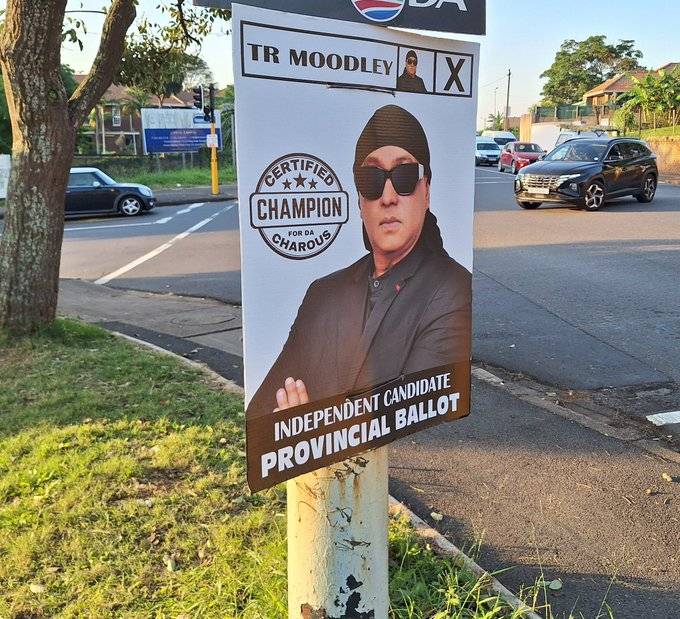
Thanasagren Moodley was the highest performing independent candidate with about 12 000 votes. (Suntosh Pillay/X)
For the first time in South African election history, independent candidates could contest in the provincial and national elections. About 10 independents ran but they did not perform well. The highest performing independent candidate was Thanasagren Moodley in KwaZulu-Natal, with about 12 000 votes, and the second highest was Anele Mda in Gauteng with about 3 000 votes.
Because this is the first time this model is being tested and South Africa has a very political party oriented model, expecting major success on the first try would have been unrealistic. The independent candidates struggled to perform well compared to established political parties for several reasons:
1. Resources: The political parties had substantial financial resources and organisational infrastructure. This includes funding for campaigns, staff, advertising and other essential components of a successful campaign. Independents often lack access to similar resources.
2. Name recognition: Candidates from major parties benefit from the party’s brand recognition and existing support base. Independent candidates often start with little to no name recognition and must build their visibility from scratch. South Africa being a populist country, it truly matters who you are when running for elections.The success of the uMkhonto weSizwe (MK) party is clear evidence of how populism works in this country. Most of the independent candidates are not well known, except perhaps Zackie Achmat who made his mark as the co-founder of the Treatment Action Campaign.
3. Voter perceptions and loyalty: Many voters have strong party loyalties and are inclined to vote along party lines. Independent candidates can struggle to convince these voters to deviate from their usual preferences. South Africa still largely believes in the political party models and the idea of trusting an individual to represent their interests will take time to incorporate into the system.
4. Media coverage: South African media outlets focused on candidates from major parties, providing them with more coverage and public exposure. Independent candidates found it difficult to get the media’s attention.
5. Debate: Many of the political debates before the elections mostly featured candidates from the major political parties, limiting independent candidates’ ability to reach voters.
6. Campaign infrastructure: Established parties have a ready-made campaign infrastructure, including volunteers, data on voters and established methods for reaching them. Independents had to build this infrastructure from scratch.
7. Strategic voting: Voters may have hesitated to vote for an independent candidate for fear of “wasting” their vote, particularly considering how closely contested these elections were. They may prefer to vote for parties that will have substantial influence in the respective legislatures.
8. Policy platform: Political parties have comprehensive platforms that address a wide range of issues, hence they have detailed manifestos. Many of the independent candidates for this election would highlight one or two things that they intend to focus on if elected, which in the eyes of voters may not address their needs.
9. Institutional barriers: The political system is designed to favour a party system, making it structurally difficult for independents to compete effectively. While the Electoral Amendment Act introduced new systems, the creation of a system that accommodates both independent and political parties is yet to be created.
Despite these difficulties, it is worth acknowledging these brave people who decided to run for elections independently in a highly contested election. Perhaps analysing instances where independent candidates have succeeded would help understand the dual system better.
Whether we like it or not, it matters who you are. Independent candidates with significant personal popularity and charisma, often due to prior public service, celebrity status or strong community ties, have won elections elsewhere. For example, in the United States, Jesse Ventura, who was a former professional wrestler, and Bernie Sanders leveraged on their high public profiles and charisma to win the voters.
In certain political environments, independent candidates can capitalise on widespread dissatisfaction with existing parties. Independent candidates often find more success in local elections where personal reputation and direct voter contact matter more than party affiliation. Perhaps the independent candidates may need to start at a local level and prove their way to the top.
Supporting independent candidates and creating systems to facilitate their success in elections requires addressing the structural and practical difficulties they face. First, strategies to support independent candidates need to be developed through campaign finance reform to reduce the financial advantage of established parties, introduce limits on campaign spending to level the playing field and provide grants or matching funds for independent candidates who reach a certain threshold of support.
A second strategy is simplifying the process for independent candidates to get on the ballot by reducing signature requirements and other legal hurdles.
Third, mandate equal media coverage for all candidates, including independents, especially in debates and major election coverage and push the media to provide public broadcasting time for independent candidates. This may even extend to the establishment of non-partisan commissions to oversee the inclusion of independent candidates in public debates and set clear, attainable criteria for debate participation that do not exclude independent candidates.
Two other important things that need to be done is to enhance voter education on the importance of independent candidates and to create support networks for them. Additionally, creating organisations or networks that provide resources and support for independent candidates, such as training, fundraising assistance and strategic advice would make this journey better for them.
The electoral commission should learn from this first election that has included independent candidates. Otherwise at a provincial and national level, the country may never see independent candidates successfully contest.
Karabo Mokgonyana is a legal and development practitioner who focuses on human rights protection, international trade and investment and peace and security.
 (1).png)
 7 months ago
65
7 months ago
65


















